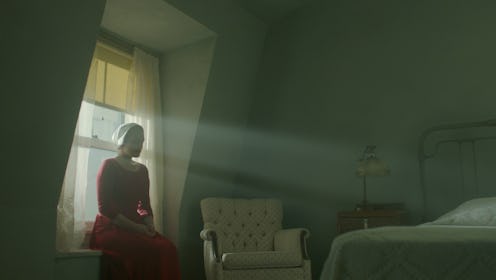
A few years ago, The Handmaid's Tale may have seemed distant, improbable — a haunting piece of '80s fiction still frightening but far less relevant. But in 2017 it carries newfound prescience, in large part because the political climate of the '80s feels staggeringly similar to the tumultuous landscape we now find ourselves in. And in Hulu's freshly unveiled television retelling of the original novel, the inspiration for The Handmaid's Tale has never felt more timely.
The book itself is unnerving in any era, imagining a totalitarian dystopia in which women are stripped of their most fundamental rights, their bodies seized like property and claimed as government-issued wombs. In Gilead, women are falsely fetishized. On the surface, they're hailed as symbols of motherhood and strength, but their value is defined strictly by their servitude to men and children. The minute they're deemed worthless or insubordinate, they're shipped off to a toxic wasteland and left for dead.
The story is grounded in the idea that America could somehow lapse into the Puritanical principles it was once founded on, unraveling centuries of hard-fought progress and reverting a liberal democracy into a patriarchal dictatorship. It's an extremist take — even by author Margaret Atwood's own admission — but nearly 35 years later, it remains a disturbingly enduring thought.
When The Handmaid's Tale was published in 1985, Ronald Reagan was midway through his two-term presidency. He'd succeeded Jimmy Carter, whose platform, like Barack Obama's, had been defined by leftist, big-government policies. By the time that Reagan took office, the economy was in a slump: imports were surging, blue-collar jobs were at risk. He championed lower taxes, less government interference, and a strong national defense, winning over voters with promises to restore prosperity and "Make America Great Again" — the same slogan Trump repurposed for his own campaign.
Like Trump, Reagan was a bit of an outsider, though as California's former governor, he had a slightly more decorated resume. He'd been a Hollywood actor; Trump, a reality star. Both were considered polarizing candidates, and while Reagan remained popular amongst the American public, he was chastised for his neglect of minority and LGBT issues. His reluctance to address the AIDS epidemic framed him as anti-gay in the eyes of many, while his backing of the War On Drugs drew accusations of race-baiting and bias. Trump, of course, has also been trailed by concerns of racism and homophobia — contentions only reinforced by his divisive travel ban and reversal of transgender bathroom protections.
Three episodes into Handmaid's Tale, the show has yet to delve significantly into race, but it's certainly touched on homosexuality: In Gilead, gay people are condemned as "gender traitors," and their genitals mutilated as punishment. But while those issues are no less crucial, the crux of Handmaid's story centers on the looming threat to women — the ownership of their lives, their bodies. And against the war on reproductive rights still raging on today, it doesn't lose its wallop.
Reagan vocally opposed the Equal Rights Amendment, referred to single mothers reliant on federal assistance as “welfare queens," and — despite initially supporting the Therapeutic Abortion Act — upheld a pro-life platform throughout his remaining career. In fact, he was the first to enact the Mexico City Policy — colloquially known as the Global Gag Rule — an international anti-abortion policy that Trump reinstated in January.
Since announcing his presidential bid back in 2015, Trump, too, has positioned himself as an anti-feminist figure. In addition to failing to secure representation for women in congress, his effort to defund Planned Parenthood puts women's access to affordable health care directly at risk. He also infamously bragged that he could “grab [women] by the pussy,” has repeatedly degraded women with sexist, short-sighted comments, and been accused of harassment and sexual assault by more than 10 women (He has denied all allegations).
If those links weren't already explicit, consider this: At a recent legislative hearing in Texas over two anti-abortion bills, women showed up to protest in Handmaid’s Tale outfits: red robes, white bonnets, the whole shebang.
It's worth noting that the ties between 1985 and 2017 don't rest solely on the shoulders of our leadership, though they certainly haven't abated the hateful rhetoric their platforms tend to breed. Early in The Handmaid's Tale, Offred recounts how she and her fellow Handmaids were ordered to berate and blame a gang-rape victim — a severe depiction, but one strikingly similar to the victim-shaming that still plagues modern society. What's more, Gilead leverages their coup with contemporary touchstones: terrorism, protests, environmental crises.
Already, we have a purportedly liberal democracy claiming agency over other people’s bodies, and Handmaid's Tale does well to emphasize how things started small, building slowly from seemingly innocuous restrictions to a full-blown affront on freedom. “Nothing changes instantaneously: in a gradually heating bathtub, you’d be boiled to death before you knew it," Offred cautions.
That's not to say something as radical as the Republic of Gilead is imminent, but when our politics don't look much different than they did three decades ago, it should give you pause. As we watch Offred's life collapse on-screen, we see flashes of what her world was like before, and it looks a hell of a lot like the one we're living in now. Except then, as Offred says, they were "asleep," and before they knew it, they'd been stewed alive. The Handmaid's Tale, then, isn't meant as a prophecy so much as it is a blaring warning call: Fight and fight now, before we're drowned by our own inaction.